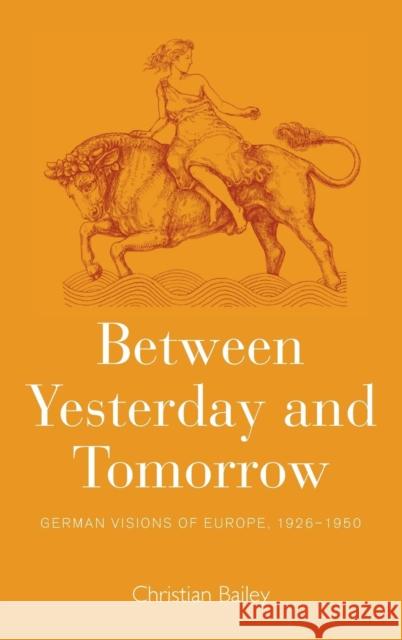Between Yesterday and Tomorrow: German Visions of Europe, 1926-1950 » książka
Between Yesterday and Tomorrow: German Visions of Europe, 1926-1950
ISBN-13: 9781782381396 / Angielski / Twarda / 2013 / 274 str.
Between Yesterday and Tomorrow: German Visions of Europe, 1926-1950
ISBN-13: 9781782381396 / Angielski / Twarda / 2013 / 274 str.
(netto: 485,11 VAT: 5%)
Najniższa cena z 30 dni: 498,70
ok. 22 dni roboczych.
Darmowa dostawa!
"By looking at political and intellectual discourses from a wide array of political perspectives (conservative, Catholic, regional, social democratic), this book makes several important points in discussing various rival conceptions of 'Europes that never happened' but that allowed a diverse array of political groupings to converge on support for European integration. This book will resonate not just with historians but also political scientists and sociologists." - Eric Langenbacher, Georgetown University "This is a fluently written and clearly argued text, well researched and neatly organized in terms of logical structure and narrative delivery...It is fresh and original, and offers new views of intellectual life in the early years of the fledgling Bonn Republic and will no doubt attract a good amount of attention in the field of post-1945 German and European History." - Paul Betts, University of Oxford An intellectual and cultural history of mid-twentieth century plans for European integration, this book calls into question the usual pre- and post-war periodizations that have structured approaches to twentieth-century European history. It focuses not simply on the ideas of leading politicians but analyses debates about Europe in "civil society" and the party-political sphere in Germany, asking if, and how, a "permissive consensus" was formed around the issue of integration. Taking Germany as its case study, the book offers context to the post-war debates, analysing the continuities that existed between interwar and post-war plans for European integration. It draws attention to the abiding scepticism of democracy displayed by many advocates of integration, indeed suggesting that groups across the ideological spectrum converged around support for European integration as a way of constraining the practice of democracy within nation-states. Christian Bailey is a lecturer in history at The Open University and at Balliol College, Oxford. After having completed his PhD at Yale University, he was appointed Max Kade Fellow at the Free University in Berlin and has worked as a postdoctoral researcher at the History of Emotions Research Center in the Max Planck Institute for Human Development, Berlin.
"By looking at political and intellectual discourses from a wide array of political perspectives (conservative, Catholic, regional, social democratic), this book makes several important points in discussing various rival conceptions of Europes that never happened but that allowed a diverse array of political groupings to converge on support for European integration. This book will resonate not just with historians but also political scientists and sociologists." · Eric Langenbacher, Georgetown University"This is a fluently written and clearly argued text, well researched and neatly organized in terms of logical structure and narrative delivery...It is fresh and original, and offers new views of intellectual life in the early years of the fledgling Bonn Republic and will no doubt attract a good amount of attention in the field of post-1945 German and European History." · Paul Betts, University of OxfordAn intellectual and cultural history of mid-twentieth century plans for European integration, this book calls into question the usual pre- and post-war periodizations that have structured approaches to twentieth-century European history. It focuses not simply on the ideas of leading politicians but analyses debates about Europe in "civil society" and the party-political sphere in Germany, asking if, and how, a "permissive consensus" was formed around the issue of integration. Taking Germany as its case study, the book offers context to the post-war debates, analysing the continuities that existed between interwar and post-war plans for European integration. It draws attention to the abiding scepticism of democracy displayed by many advocates of integration, indeed suggesting that groups across the ideological spectrum converged around support for European integration as a way of constraining the practice of democracy within nation-states.Christian Bailey is a lecturer in history at The Open University and at Balliol College, Oxford. After having completed his PhD at Yale University, he was appointed Max Kade Fellow at the Free University in Berlin and has worked as a postdoctoral researcher at the History of Emotions Research Center in the Max Planck Institute for Human Development, Berlin.











